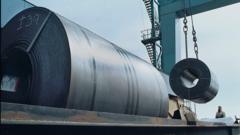The German car industry, historically the backbone of the nation’s economy, is at a decisive crossroads. The “Big Three”—Volkswagen, Mercedes-Benz, and BMW—are contending with plummeting sales, rising costs, and fierce competition, especially from emerging markets like China. This shift represents a profound challenge as Germany grapples with its reputation as an automotive powerhouse.
**Reviving Germany's Automotive Industry: A Historic Challenge Ahead**

**Reviving Germany's Automotive Industry: A Historic Challenge Ahead**
Germany's automotive sector, once a symbol of economic prowess, faces mounting crises. As production dwindles and competition grows, experts outline pathways for recovery.
Wolfsburg, home to Volkswagen’s emblematic factory, epitomizes the industry's significance, akin to Detroit's identity with American auto manufacturing. However, this once-booming symbol is now reflective of larger issues as production falls well below capacity. In 2023, Volkswagen produced only 490,000 cars, down from a maximum of 870,000, revealing a broader decline across Germany's factories.
Germany's car industry, which accounts for approximately one-fifth of the nation’s manufacturing output, employs around 780,000 people directly and has a ripple effect on millions more. Nonetheless, both the production and sales of German cars have dwindled significantly, with pre-tax profits of leading manufacturers plummeting by about a third in the first nine months of 2024.
Challenges stemming from the ongoing transition to electric vehicles, exacerbated by high labor and energy costs, confront the sector. The significant investment in electric models has not matched market growth expectations, resulting in missed financial forecasts and a shakeup of traditional practices.
Adding complexity are geopolitical tensions and competition from China, where local brands are rapidly improving in quality and technology while maintaining lower operational costs. Concurrently, the rise in import tariffs poses threats amid fears of trade wars that could further damage Germany's export-dependent carmakers.
Amid this tumult, voices from the industry propose various paths to recovery. Some suggest that to remain competitive and innovative, German manufacturers may need to establish operations abroad, while others advocate for a return to harnessing the nation’s historic strengths in innovation and technology. Calls for increased government support emphasize the need for investment in infrastructure, education, and green technologies to withstand the stress of a shifting global landscape.
As the future remains uncertain for thousands of automotive workers, the industry's revival hinges on adapting to rapid changes, reclaiming technological leadership, and responding to competitive pressures on both domestic and international fronts. Emphasizing a collaborative approach could be key to steering Germany's automotive industry back onto the road to recovery.
Germany's car industry, which accounts for approximately one-fifth of the nation’s manufacturing output, employs around 780,000 people directly and has a ripple effect on millions more. Nonetheless, both the production and sales of German cars have dwindled significantly, with pre-tax profits of leading manufacturers plummeting by about a third in the first nine months of 2024.
Challenges stemming from the ongoing transition to electric vehicles, exacerbated by high labor and energy costs, confront the sector. The significant investment in electric models has not matched market growth expectations, resulting in missed financial forecasts and a shakeup of traditional practices.
Adding complexity are geopolitical tensions and competition from China, where local brands are rapidly improving in quality and technology while maintaining lower operational costs. Concurrently, the rise in import tariffs poses threats amid fears of trade wars that could further damage Germany's export-dependent carmakers.
Amid this tumult, voices from the industry propose various paths to recovery. Some suggest that to remain competitive and innovative, German manufacturers may need to establish operations abroad, while others advocate for a return to harnessing the nation’s historic strengths in innovation and technology. Calls for increased government support emphasize the need for investment in infrastructure, education, and green technologies to withstand the stress of a shifting global landscape.
As the future remains uncertain for thousands of automotive workers, the industry's revival hinges on adapting to rapid changes, reclaiming technological leadership, and responding to competitive pressures on both domestic and international fronts. Emphasizing a collaborative approach could be key to steering Germany's automotive industry back onto the road to recovery.






















